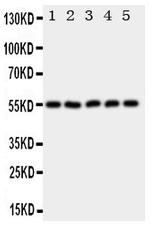Search Thermo Fisher Scientific
FIGURE: 1 / 1
HYAL2 Antibody (PA5-95061) in WB

Product Details
PA5-95061
Species Reactivity
Host/Isotype
Class
Type
Immunogen
Conjugate
Form
Concentration
Purification
Storage buffer
Contains
Storage conditions
Shipping conditions
RRID
Product Specific Information
Reconstitute with 0.2 mL of distilled water to yield a concentration of 500 µg/mL.
Target Information
This gene encodes a weak acid-active hyaluronidase. The encoded protein is similar in structure to other more active hyaluronidases. Hyaluronidases degrade hyaluronan, one of the major glycosaminoglycans of the extracellular matrix. Hyaluronan and fragments of hyaluronan are thought to be involved in cell proliferation, migration and differentiation. Although it was previously thought to be a lysosomal hyaluronidase that is active at a pH below 4, the encoded protein is likely a GPI-anchored cell surface protein. This hyaluronidase serves as a receptor for the oncogenic virus Jaagsiekte sheep retrovirus. The gene is one of several related genes in a region of chromosome 3p21.3 associated with tumor suppression. This gene encodes two alternatively spliced transcript variants which differ only in the 5' UTR.
⚠WARNING: This product can expose you to chemicals including mercury, which is known to the State of California to cause birth defects or other reproductive harm. For more information go to www.P65Warnings.ca.gov.
For Research Use Only. Not for use in diagnostic procedures. Not for resale without express authorization.
References (0)
Bioinformatics
Protein Aliases: Hyal-2; hyaluronidase 2; Hyaluronidase-2; Hyaluronoglucosaminidase-2; LuCa-2; Lung carcinoma protein 2; lysosomal hyaluronidase; PH-20 homolog; PH20 homolog
Gene Aliases: AI256841; AU020858; AW555733; HYAL2; LUCA2
UniProt ID: (Human) Q12891, (Mouse) O35632
Entrez Gene ID: (Human) 8692, (Rat) 64468, (Mouse) 15587

Performance Guarantee
If an Invitrogen™ antibody doesn't perform as described on our website or datasheet,we'll replace the product at no cost to you, or provide you with a credit for a future purchase.*
Learn more
We're here to help
Get expert recommendations for common problems or connect directly with an on staff expert for technical assistance related to applications, equipment and general product use.
Contact tech support
